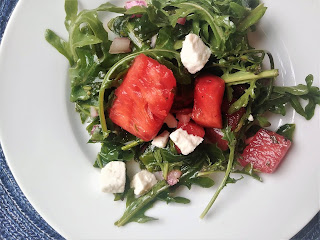Bread and Wine: Watermelon Feta Salad
Today it is very pretty outside. The sun very warm, the breeze and shade a little cooler with a hint of fallish dryiness on the edges. My son and I played outside a while before his nap. My daughter, fighting a stomach bug, has been resting and playing in her crib a lot of the afternoon.
It's been a challenging weekend, what with my daughter's birthday party, my son walking and deciding to get into everything, and my husband and I trying to make last plans for upcoming trips. I've felt far less creative than usual--plenty of ideas still with little time to get them done or much energy to in fact get them done.
I fumbled through some feeds on Facebook where one of my writer friends posted about opposition--opposition to your work, even when you know you're in the right spot. The truth is, it happens, and faith and faithfulness and patience is necessary to tread those times. And prayer. Prayer above all.
I was glad to see those words. After the last few weeks I was starting to wonder if I have been fooling myself about this blog project. With a busy, growing family, Mom's writerly identity seems of the least importance.
My mind handled those thoughts as I puttered through cleaning my mess of a kitchen; I felt unanchored, disoriented. My mind was so noisy. When my mind is so noisy I become afraid of what I am not hearing and all that I am.
Dear God, I prayed, help.
I felt redirected to the kitchen where I could work on Niequist's Watermelon Feta Salad and chop and snack in peace and quiet. When my world feels very noisy, it does me a lot of good to walk away for a bit and start chopping something. The smells, the texture, the kind offering to myself of flavor and texture, is grounding. The noise quiets.
The Recipe: Watermelon Feta Salad
Watermelon, feta cheese, fresh mint, red onion, arugula, lime juice, white wine vinegar, olive oil, salt and pepper
I'll be honest, I edited this recipe a great deal for my own purposes. I love salad, and my husband will eat salad, but there's no way we eat consume the enormous quantities this recipe makes (it's great for a dinner party of 6-8), so I halved what Niequist writes and continued to adjust from there.
I essentially made it like I would any salad--take the ingredients, eyeball what I think we could eat in a few days, and chopped accordingly. It turned out just fine. Really tasty. My favorite part is probably the vinaigrette it makes. I think I'd bottle that by itself and just keep on hand for using on greens, maybe some sweet dinner rolls, or you know, my fingers.
The Chapter: Delicious Everywhere
This chapter really could not come at a better time. I have to admit I began rereading it about two weeks ago and was fully prepared to pass it off as a throwaway chapter--a short reflection on food and how great it is to travel...blah, blah, blah.
Today I sat down and my heart felt comforted. More than a reflection on food and travel, Niequiest reflects on their importance, not just for the individual but for the family.
I needed this. Some days when I am not cooking, I wonder, "Why do I cook?" (Interesting that I find whenever I am cooking I never feel the need to question it) I often feel so silly in a world of so many instant dinners and even very good quality meals available for takeout. Why do I bother with the hassle of making food? It makes so many dirty dishes.
Niequist's answer: Food became a language for understanding, even more so than museums or history lessons.
She recalls the countries she traveled with her father as a middle and high schooler and how he taught to her to eat in each place. "He taught me that wherever we are, we eat what they eat, and we eat what they give us, all the time. We taste the place when we eat what our hosts eat."
The result, Niequist says, is that "my memories of the places I've visited locate themselves almost entirely in my senses, particularly in my tastes and smells." Every country, every city is associated with certain flavors and scents particular to it, and they become a kind of personal portal for her to that place if ever she catches that flavor or scent elsewhere.
She has so many good, delicious memories-- the raw green olives in Positano, the limoncello in Capri, the watermelon feta salad at the Atlantis in Martha's Vineyard. All of them valuable not merely for their loveliness, but for their place in the vast array of experiences the world offers. "I want it all," she says, "All the tastes, all the smells, all the stories and memories and traditions, all the textures and flavors and experiences, all running down my chin, all over my fingers."
Then there's this--my favorite part: getting her kids involved.
"We travel because I want my kids to learn, as I learned, that there are a million ways to live, a million ways to eat, a million ways to dress and speak and view the world. I want them to know that 'our way' isn't the right way, but just one way, that children all over the world, no matter how different they seem, are just like the children in our neighborhood-they love to play, to discover, to learn."
"I want my kids to taste and smell and experience the biggest possible world, because every bite of it, every taste and texture and flavor, is delicious."
Eating is a portal of experience, a language for communication and understanding. We get to pass this on to our kids.
Good enough reason to travel, to try new things, but still, I'll take it one consideration further: Why cook?
I chatted about this with a friend of mine at lunch this week. She and her wife cook frequently, reviving family recipes, experiencing new tastes. They too, are questioned by others. Why cook? Why not merely open a box of something?
My friend affirmed that cooking was something like a gift she and her wife could give one another--memories, affirmation of one another's families and traditions. Plus, they actually enjoy it. They like the process, the experience. She described making traditional Louisiana shrimp and grits and how delicious it was; making homemade egg noodles and her wife's grandfather laughing at her for making them too thin (oh, how her arms ached from the rolling pin, too!) We laughed and got hungry describing each other's favorite dishes.
Even thought my friend and I are quite different, from different backgrounds and lifestyles, we're laughing, talking, sharing experiences. Over food. (We also adore many of the same books, so we always have lots to talk about).
Ultimately, the same thing can be said about anything we enjoy, right? Football games, or television shows, painting or paintball. Sharing what we love with others has a way of rising us above our many differences and uniting us in enjoyment, in play.
I think what's unique about food, about cooking, though, is that each one of us has to eat, someway, somehow, so it's this fundamental thing that has the power and potential to connect us to others perhaps more so than other interests. The way we think and talk about how we fuel our bodies is an inherent language of both expression and understanding. I've learned that I can tell a great deal about someone who professes to hate cooking and eats mostly from boxes and takeout, just as I can about someone who is very particular and exacting about what they eat.
Realizing this, I'm trying to pay more attention to how I cook and don't cook, eat and don't eat, and what I am expressing and how I want people to understand me. I hope I'm expressing openness and curiosity as I try new recipes, new flavors (I especially hope I communicate that to my kids); I hope I create a table that invites others to the conversation to enjoy and experience new flavors as well.
And all of this tumbles into the kind of family I want to nurture, the community I want to be build.
All of that from cooking.
So pressing forward, I eventually made this incredible Watermelon Feta Salad to remind myself of these things. Cooking, chopping, putting together new tastes and flavors, ultimately affirms the kind of life I want to put together.
And it can be so very delicious.



Comments
Post a Comment